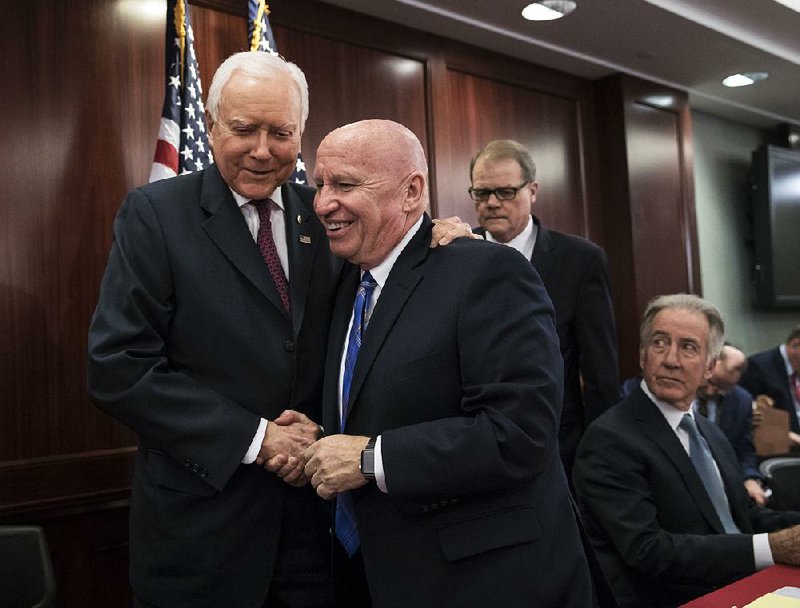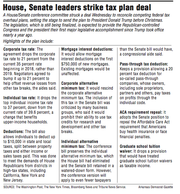WASHINGTON -- Congressional Republicans on Wednesday sped forward with the most sweeping tax rewrite in decades, announcing an agreement in principle on a final bill that would cut taxes for businesses and individuals and mark the party's first major legislative achievement since assuming political control this year.
Party leaders in the House and Senate agreed to bridge the yawning gaps between their competing versions of the $1.5 trillion tax bill, keeping Republicans on track for final votes next week with the aim of delivering a bill to President Donald Trump's desk by Christmas.
"Let's not waver now -- let's not give in to the Washington status quo -- not when tax reform is so close," said Rep. Kevin Brady, R-Texas, chairman of the tax-writing House Ways and Means Committee.
The measure has come under assault by Democrats who say it is unfairly tilted in favor of business and the wealthy.
Sen. Charles Schumer, the Senate minority leader, said the public doesn't know all the details of the bill "but they smell what's going on, and that is tax cuts for the wealthiest and no help for so many in the middle class."
New York's Schumer predicted that the politically unpopular bill would drag down Republicans in next year's congressional elections. "I believe they'll pay a very steep price for this bill in 2018," he said.
The House and Senate versions of the tax bill started from the same core principles -- cutting taxes on business sharply while reducing rates and eliminating some breaks for individuals -- but diverged on several key details.
In the end, more of the Senate bill appeared to be included in the final version, though lawmakers continued to make significant changes from the legislation that passed either the House or the Senate.
The changes included a corporate tax rate of 21 percent, slightly higher than the 20 percent in the legislation that passed both chambers, and a lower top individual tax rate of 37 percent for the wealthiest Americans, who currently pay 39.6 percent. But the bill will still scale back some popular tax breaks, such as the state and local tax deduction and the deductibility of mortgage interest.
In a break from the House bill, the agreement would allow taxpayers to continue to deduct high out-of-pocket medical expenses, and it would retain a provision allowing graduate students who receive tuition stipends to avoid paying taxes on that benefit.
Also included in the consensus bill is the Senate's repeal of the Patient Protection and Affordable Care Act's individual mandate, which is the requirement that most Americans have health insurance or pay a penalty, and a provision opening the Arctic National Wildlife Refuge to energy exploration.
Still unclear is the overall revenue loss of the revised legislation, which cannot exceed the $1.5 trillion bucket lawmakers have allowed if they want to pass the bill without Democratic support. Several of the provisions added by the Senate to help pay for the overall bill were either reversed or scaled back in the consensus version, and some tax breaks eliminated by the House were added back in.
The announcement that Republicans had overcome their differences to get to a consensus bill added more fuel to an already fast-moving sprint to the finish line. Republicans dismissed requests by Democrats to delay a vote until the new senator from Alabama, Doug Jones, is sworn in.
"I see no need to wait for Doug Jones to become a senator. We vote all the time in lame-duck sessions with retired and defeated members casting votes," said Sen. Susan Collins, R-Maine.
Sen. John Cornyn of Texas, the majority whip, told reporters that he was confident the final bill will be approved next week. The heads of the tax-writing committees in the House and Senate, Brady and Sen. Orrin Hatch of Utah, each proclaimed a bill "close" to completion.
In a compromise between the bills, the deal would cap the popular deduction for interest on mortgage debt at $750,000 for newly purchased homes, a higher cap than the $500,000 limit in the House-passed bill but lower than the $1 million limit that currently exists and remains in the Senate-passed bill.
The agreement would cut the corporate tax rate to 21 percent, which is lower than the current 35 percent rate but higher than the 20 percent that Trump had, until recently, said was nonnegotiable. The corporate rate will go into effect in 2018, rather than 2019 as the Senate bill originally called for, according to a senior Republican congressional aide.
The bill also allows individuals to somewhat choose how to use their state and local tax deduction, giving them the ability to write off up to $10,000 in property, income or sales taxes paid or a combination of property and sales or property and income taxes. That move is intended to alleviate the concerns of House Republicans, particularly those from California, over the bill's treatment of the state and local tax deduction.
Lawmakers also yielded to concerns by business groups about the Senate's last-minute inclusion of the corporate alternative minimum tax, which was added as a way to pay for the bill but faced stiff blowback from companies that said it would restrict their ability to use the research and development tax credit.
To assuage concerns that wealthy individuals would face a potential tax increase because of other provisions in the bill, the top individual income tax rate will drop to 37 percent, down from the current rate of 39.6 percent in the Senate bill and the 38.5 percent in the House bill. And the lower rate will apply to more people, allowing those with income levels below the $1 million cutoff outlined in both the House and Senate bills to claim the marginal rate.
The conference bill will preserve the individual alternative minimum tax, which the House bill had eliminated and the Senate bill retained in a watered-down form. But it will apply to even fewer taxpayers than the Senate bill would have, the congressional aide said. The alternative tax, which was put in place to ensure high-income earners didn't exploit loopholes to avoid paying taxes, would kick in for individuals earning $500,000 and above and couples earning $1 million or more.
GOP DOUBTERS
It was not clear whether all Republican senators would roundly endorse the deal, which contains provisions that Collins and Sen. Marco Rubio of Florida had raised concerns about earlier this week.
Collins has said she's not in favor of a lower individual rate, and Rubio has pushed for a more generous child tax credit.
Still, none of those concerned senators indicated Wednesday that they were opposed in principle to the bill taking shape under the agreement, an encouraging sign for Republican leaders.
The Senate bill narrowly passed 51-49, with Sen. Bob Corker, R-Tenn., voting against the legislation, and other lawmakers, such as Collins, only getting on board once certain changes were made, such as expanding the medical expense deduction. Corker said Wednesday that "nothing has alleviated the concerns" that caused him to oppose the bill, which were rooted in a desire not to add further to the national debt.
The agreement was finalized Wednesday morning, hours before the first and only scheduled public meeting of the congressional conference committee formed to work out the differences between the House- and Senate-passed versions of the bill.
"Let's understand what's happening today is a sham," said Sen. Ron Wyden of Oregon, the top Democrat on the Finance Committee. "Nobody ought to mistake this conference for real debate."
Republicans meanwhile attempted to sell the bill as a boon to the economy.
"It's not my vision of the perfect, but again, this is definitely going to be a strong pro-growth tax package," said Sen. Ron Johnson, R-Wis.
Republicans see passage of the legislation as a political imperative, proving to voters they can govern as the GOP fights to hold onto its majorities in the House and Senate. Republicans said they expect the package to increase economic growth, generating additional tax revenue and lessening the hit to the budget deficit. Independent economists aren't as optimistic.
Federal Reserve Chairman Janet Yellen said she and her colleagues expect a "modest lift" to economic growth from the tax package.
Yellen said at a news conference that the likelihood of lower taxes is why Fed officials expect the economy to grow at 2.5 percent in 2018. But growth would then slip back closer to its recent 2 percent average.
She said that any wage growth would likely stem from the low unemployment rate rather than the tax cuts.
Lawmakers from Arkansas were briefed on the final version of the tax package and were awaiting the actual language, spokesmen said Wednesday.
Sen. John Boozman, a Republican from Rogers, "hasn't seen the details," said his spokesman, Patrick Creamer. But Boozman is "encouraged" that House and Senate negotiators have come up with a way "to provide tax relief for hardworking Arkansans," Creamer added.
Sen. Tom Cotton, a Republican from Dardanelle, also was waiting to review the tax legislation. "Obviously he's pleased that an agreement was reached, but I think we'll reserve comment until we actually see the conference report and confirm all the details," Cotton spokesman Caroline Tabler said.
Members of the House from Arkansas also wanted to see the language before commenting on the package.
On Wednesday, Trump delivered what was dubbed a closing argument for the tax bill from the White House, flanked by five families that each took the microphone to extol the benefits of the tax bill on their households and communities.
"As a candidate I promised we would pass a massive tax cut for the everyday, working American families who are the backbone and the heartbeat of our country," Trump said. "Now we are just days away from keeping that promise. We want to give you, the American people, a giant tax cut for Christmas."
Trump added that if the bill were to be signed in that time frame, Americans would begin seeing tax cuts reflected in their paychecks by February, citing the Internal Revenue Service.
"The cynical voices that opposed tax cuts grow smaller and weaker, and the American people grow stronger," Trump said.
Information for this article was contributed by Jim Tankersley, Thomas Kaplan and Alan Rappeport of The New York Times; by Stephen Ohlemacher, Andrew Taylor, Marcy Gordon, Kevin Freking and Ken Thomas of The Associated Press; and by Frank E. Lockwood of the Arkansas Democrat-Gazette.
A Section on 12/14/2017

